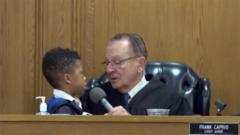As Romania prepares for its elections this weekend, the fallout from last December's annulled presidential race continues to unfold. The far-right candidate Calin Georgescu, who faced allegations of Russian interference and dubious TikTok campaigns, is banned from running, while his supporters are implicated in further controversies related to social media influence.
Romania's Election Crisis: TikTok Influencers and Foreign Interference Allegations

Romania's Election Crisis: TikTok Influencers and Foreign Interference Allegations
The upcoming Romanian elections are overshadowed by allegations of TikTok manipulation and foreign intervention that have led to a political upheaval.
The upcoming elections in Romania this weekend hinge on a backdrop of political upheaval that began last December when presidential elections were abruptly cancelled, leading to widespread protests and dissatisfaction. The initial shock of far-right candidate Calin Georgescu's unexpected victory in the first election round turned to dismay as allegations of Russian interference, dubious TikTok accounts, and covert payments to social media influencers surfaced.
Following his disqualification and subsequent detention on charges which include an attempt to destabilize the constitutional order, Georgescu maintains his innocence, suggesting a conspiracy to invalidate his electoral success. Meanwhile, George Simion of the far-right AUR party has emerged as the leading candidate ahead of the re-run election this Sunday, with other competitors such as Crin Antonescu of the National Liberal Party also in the mix.
Central to this political turmoil are several TikTok influencers, whom the Romanian government accuses of manipulating social media campaigns to give Georgescu undue prominence. A comparative analysis from an independent think tank indicated that the candidate's meteoric rise in popularity was not organic. Authorities suggest the TikTok algorithm was exploited mainly through three strategies: hiring influencers to promote Georgescu's image, deploying thousands of phony accounts to bolster positive comments, and orchestrating the activities of what is described as a "King of TikTok," who allegedly funneled significant funds into the campaign.
Though claims of Russian interference have been made, the Romanian authorities have yet to present concrete evidence, leaving many citizens frustrated and skeptical. TikTok's internal findings revealed it had to take measures against thousands of fraudulent accounts while working with local authorities to ensure a transparent electoral process; however, questions persist about the origins and motivations behind the viral campaign using the hashtag "stability and integrity," aimed at casting a favorable light on Georgescu without directly mentioning him.
As this political landscape twists and turns, influencers involved have expressed varying degrees of awareness concerning the nature of their engagements. Some claim ignorance of the funding behind campaigns purporting to promote general electoral participation, while others have noted the explosion of supportive comments following their posts, indicating a coordinated effort to boost Georgescu's visibility.
The situation escalated further in March with the arrest of influential TikToker Bogdan Peschir, known as the "King of TikTok," on charges of trying to sway voters through financial incentives, though his defenders argue his payments were not politically motivated. Amidst mounting public concern, ongoing investigations by the European Commission and Romania's judiciary continue to peel back the layers of this complex and bewildering electoral scandal, with many Romanians yearning for clarity and accountability.
As the electoral scene remains volatile, observers are left piecing together a narrative that reveals how far-reaching social media dynamics and potential foreign influences are reshaping Romanian politics during this crucial period.



















